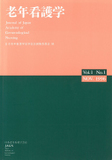Japanese
English
- 販売していません
- Abstract 文献概要
- 参考文献 Reference
本研究は脳卒中発症後2年経た発症者とその主介護者に調査を行い,家族の機能の特徴を主介護者の年齢別に捉えることを目的に行われた.対象は発症2年経た在宅脳卒中者44人とその主介護者44人である.主介護者を年齢別に若年群(59歳以下),中年群(60〜69歳),高年群(70歳以上)に分けた.介護者の続柄は若年群は嫁と子どもが主で,中・高年群は配偶者が多かった.家族の構成人数は,高年群が少なかった.若年群は暮らし向きがよく,発症により家族からの情緒的交流を得て子どもへの教育に反映させていた.中年群は福祉サービスの利用が少なかった.高年群は,家族の絆に関するAPGARスコアが低く,また同居家族以外からのソーシャルサポートも低く,自らの健康障害を抱えていた.以上から,若年群については家族からの情緒的交流と教育的側面への配慮を,中年群には各種福祉サービスへの配慮を,高年群には家族外からの情緒的サポートと健康状態への配慮をした支援の必要性が示唆された.
The purpose of this study was to clarify the influence of age group of caregiver on stroke victims by investigating family function. A sample of 44 stroke victims with a 2 years disease course and their primary caregivers was obtained. The caregivers were devided into those less than 59 years old (young group, composed of spouses and children), those aged from 60 to 69 years (middle group, mainly composed of spouses), and those over 70 years (old group, mainly composed of spouses). The young age group caregivers were enjoying relative financial conditions. The young group family members helped one another,and this had positive educational effects on the children. The middle group caregivers did not take much advantage of the public support system. The APGAR score was low in the old group caregivers, and especially they enjoyed receiving less emotional support from their neighbors than the other two groups.
In conclusion, many changes in family function dependent on the age will occur, therefore we should take this into account when we concerned intervening in case of caregivers to disabled family members.
Copyright © 1996, Japan Academy of Gerontological Nursing All rights reserved.


